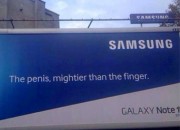“Pino is the first pleasure object ever created to satisfy the hedonistic sexual cravings and excesses exhibited by members of the financial world,” reads copy written by people still trapped in the 80s, somewhere between 9 1/2 Weeks and The Bonfire of the Vanities. The government bailouts, the foreclosure crisis, the resulting Occupy movement — none of these things exist in their suspended reality.
Advertising
Yesterday the bipartisan activist group Evolve released a 30-second spot on YouTube reminding gun-owners to lock up their weapons. The video, which has over 1.3 million views on its second day, culminates in a bit of sword play between two little boys who have gotten their hands on mom’s vibrators. The ad ends with the reminder: “If they find it, they’ll play with it, so always lock up your guns.”
The internet has been having some fun these last few days circulating an image of a Samsung billboard with a very amusing kerning error which makes the text read “The penis, mightier than the finger” instead of “The pen is mightier than the finger.” People discussing the hilarious mishap on the Galaxy Note 10.1 billboard named Egypt, Pakistan, Kenya and France as its location. The truth is less amusing.
The family-held Italian food company Barilla came under fire last week after its chairman, Guido Barilla, said that the company would never feature a same-sex family in a commercial. “I would never do (a commercial) with a homosexual family, not for lack of respect but because we don’t agree with them,” Barilla said during an interview with Italy’s national Radio 24 station. “Ours is a classic family where the woman plays a fundamental role.” Barilla, an internationally recognized brand, is known for advertising that depicts a happy family. Their slogan is, “Where there’s Barilla, there’s home.”
The number of porn stars who swear by Eat24 got the company thinking about porn — they dug in and found that a completely unsurprising 30 percent of all web traffic hits porn sites. Even less surprising, because so few brands are willing to put their products next to porn, Eat24 discovered that advertising on these sites was one tenth the cost of advertising on Google or social sites like Facebook and Twitter. They went for it, and their story is going to go down in history as an advertising coup — but will other mainstream brands follow suit?
Sex sells pretty much everything except itself, so when it comes to campaigns to raise awareness about sexual issues, people have had to get a little creative. Here are three of the more interesting campaigns that have been launched in the name of awareness. Condom dress? Check. Digital little black book? Check. Scary as hell, bordeline entophilic ads? Yeah, sorry about that.
You would think that given how much advertising seems to depend on sex to sell things that it would be in the industry’s interest to try to get sex right, or at least be sensitive to sex-related issues that have powerfully impacted the national consciousness. Is the inability to create ads that portray sex and desire decently the result of an industry in dire need of fresh blood, or is it that advertisers are showing an increased interest in exploiting hot topics to get more “engagement” out of their ads?
This week, the sportswear brand Stüssy launched a Facebook campaign to get an extra bit of edge. The campaign, centered on Facebook, enables users to strip the model by liking the Stüssy page. “The more likes, the more clothes come off!” Stüssy promises fans. Clicking the Like button enabled us to watch the model — who is apparently decked out in their entire Spring/Summer 2012 collection — do a little dance, removing a piece of clothing in each frame until she was down to her skivvies.
In a world where a lot of sexually coercive situations involve alcohol, it’s unconscionable to run an ad like the one Belvedere put out last Friday. In fact, horrible economy or not, we hope the people responsible were not only fired immediately, but tattooed on the forehead with the words “utterly unhirable.”
If this e-mail is truly from Goodby, Silverstein & Partners, I can only see their corporate position as dismissive and exploitative at best. Instead of transparency, which is what it looks like at first, they are cherry-picking the content they feature, focusing on everything but the heart of this conversation: that their ads are sexist.















